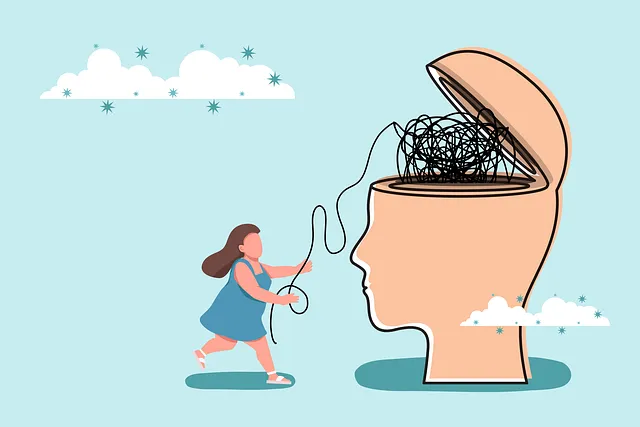Mood regulation, as emphasized by Kaiser Permanente behavioral health services Littleton, is a cornerstone of well-being. Understanding one's mood patterns, utilizing evidence-based techniques like cognitive behavioral therapy, and adopting holistic practices such as mindfulness, nutrition, exercise, and sleep hygiene are crucial in preventing mental health disorders like depression and anxiety. The facility offers diverse programs, including individual therapy, group support, and unique initiatives tailored to address burnout prevention and foster emotional intelligence through cultural sensitivity.
“Discover effective mood regulation strategies that can transform your well-being. This comprehensive guide explores various techniques, from cognitive therapies recommended by Kaiser Permanente Behavioral Health Services Littleton to lifestyle changes focusing on nutrition, exercise, and sleep. Learn how mindfulness and relaxation practices can cultivate inner peace. By understanding the foundation of mood regulation, you’ll gain tools to navigate emotional challenges with balance and resilience.”
- Understanding Mood Regulation: A Foundation for Well-being
- Kaiser Permanente Behavioral Health Services Littleton: An Overview
- Cognitive Techniques for Effective Mood Management
- Lifestyle Changes: Nutrition, Exercise, and Sleep for Emotional Balance
- Mindfulness and Relaxation Practices: Cultivating Inner Peace
Understanding Mood Regulation: A Foundation for Well-being

Understanding Mood Regulation: A Foundation for Well-being
Mood regulation is a crucial aspect of overall well-being, and it involves managing and maintaining emotional states to enhance mental health. Kaiser Permanente behavioral health services Littleton emphasizes the importance of recognizing and understanding one’s mood patterns as a fundamental step towards achieving mental wellness. By acknowledging the interplay between thoughts, feelings, and behaviors, individuals can begin to navigate their emotional responses more effectively. This process is especially vital in today’s fast-paced world, where burnout prevention has become a significant concern.
The ability to regulate moods plays a pivotal role in preventing conditions such as depression and anxiety, which are often linked to persistent emotional dysregulation. Mental health policy analysis and advocacy groups highlight that proactive mood regulation strategies can foster resilience and improve overall mental wellness. Through various techniques, including mindfulness, cognitive behavioral therapy, and stress management practices, individuals can learn to respond to challenging situations with more adaptability and flexibility. These strategies not only empower individuals but also contribute to a healthier society by reducing the burden of mental health disorders.
Kaiser Permanente Behavioral Health Services Littleton: An Overview

Kaiser Permanente Behavioral Health Services Littleton stands as a beacon of mental wellness support within the healthcare community. This facility offers a comprehensive suite of services designed to cater to various aspects of behavioral health, from individual therapy sessions to group support programs. Their approach integrates evidence-based practices and innovative strategies, ensuring individuals receive tailored care to navigate challenges and promote resilience.
One notable aspect is their emphasis on Mental Wellness Journaling, encouraging patients to reflect on emotions and experiences as a therapeutic tool. Additionally, the center facilitates Burnout Prevention Strategies for Healthcare Providers, recognizing the unique pressures faced by medical professionals. Through workshops and initiatives like Community Outreach Program Implementation, Kaiser Permanente Littleton actively fosters connections within the community, further enriching their support network.
Cognitive Techniques for Effective Mood Management

Cognitive techniques form a cornerstone of mood regulation strategies offered by Kaiser Permanente behavioral health services Littleton. These evidence-based practices empower individuals to recognize and challenge negative thought patterns that can contribute to emotional distress. Techniques such as cognitive restructuring, mindfulness meditation, and positive self-talk help reframe unhelpful thoughts into more balanced perspectives. For instance, replacing “I’m a failure” with “I made a mistake” can significantly alter one’s mood and outlook.
Cultural sensitivity in mental healthcare practice plays a vital role in these strategies. Understanding and incorporating cultural nuances ensures that interventions resonate deeply with individuals from diverse backgrounds. This tailored approach enhances depression prevention efforts and fosters emotional intelligence—the ability to recognize, understand, and manage one’s own emotions as well as those of others. By combining cognitive techniques with cultural sensitivity, Kaiser Permanente behavioral health services Littleton equips its clients with robust tools for effective mood management.
Lifestyle Changes: Nutrition, Exercise, and Sleep for Emotional Balance

Maintaining emotional balance is closely tied to adopting a holistic lifestyle approach. Kaiser Permanente behavioral health services Littleton emphasizes the power of self-care routines for better mental health and emotional well-being promotion techniques. When it comes to lifestyle changes, nutrition plays a pivotal role in mood regulation. Incorporating nutrient-rich foods can positively impact brain chemistry, thereby influencing one’s overall mood and emotional stability.
Additionally, regular physical activity is a game-changer for emotional resilience. Exercise stimulates the release of endorphins, often referred to as ‘feel-good’ hormones, which can reduce stress, anxiety, and depression. Whether it’s a daily walk, yoga session, or intense workout at the gym, finding an exercise routine that aligns with your preferences is essential for inner strength development. Equally crucial is prioritizing sleep hygiene, as adequate rest allows the body to restore and rejuvenate, thereby supporting emotional balance and overall well-being.
Mindfulness and Relaxation Practices: Cultivating Inner Peace

Mindfulness and relaxation practices play a pivotal role in mood regulation, offering powerful tools for managing emotional well-being. Kaiser Permanente behavioral health services Littleton emphasizes these techniques as effective methods to cultivate inner peace and enhance overall mental resilience. By incorporating mindfulness into daily routines, individuals can learn to stay present, reducing the impact of stressful thoughts and feelings. This practice involves focusing on the here and now, observing one’s breath, body sensations, and surroundings without judgment.
Relaxation techniques, such as deep breathing exercises, progressive muscle relaxation, and guided imagery, are also integral to this process. These practices help lower stress levels, reduce anxiety, and promote a sense of calm. For those struggling with depression prevention or seeking anxiety relief, these mindfulness and relaxation strategies offer a natural and effective approach to improve mood regulation and overall quality of life. Conflict resolution techniques can further be integrated into this practice, enabling individuals to navigate challenging situations with greater composure and emotional intelligence.
Mood regulation is a multifaceted journey towards emotional well-being, as highlighted by various strategies discussed in this article. From understanding the basics of mood management to exploring cognitive techniques and lifestyle changes, each section offers valuable insights. Incorporating practices like mindfulness and relaxation into daily routines can significantly enhance emotional balance. For those seeking professional guidance, Kaiser Permanente Behavioral Health Services Littleton provides comprehensive support, ensuring individuals have access to effective tools for navigating their moods and improving overall mental health.






